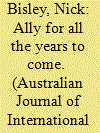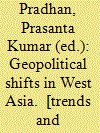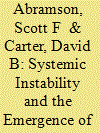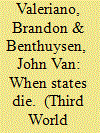| Srl | Item |
| 1 |
ID:
127061


|
|
|
|
|
| Publication |
2013.
|
| Summary/Abstract |
In 2011, Australia communicated a clear choice about its strategic future. It would continue to cleave tightly to the US alliance, expand its military links and work to advance the USA's conception of regional order. Given its economic interests, why has Australia bound itself to the US alliance? What lies behind this strong commitment and what would it take for Australia to change its relationship with the USA? This article presents an analysis of the current state of the US-Australia alliance and argues that Canberra's pursuit of close relations with the USA reflects the interaction of a rational calculation of the costs and benefits of the alliance with a set of resolutely political factors that have produced the current policy setting. The article first assesses the security cost and benefit behind the alliance. It then argues that the move also derives from the strong domestic support for the US alliance, a sharpened sense that China's rise was generating regional instability that only the US primacy could manage and the realisation that the economic fallout of such a move would be minimal. It concludes with a brief reflection on what it might take to change the current policy settings.
|
|
|
|
|
|
|
|
|
|
|
|
|
|
|
|
| 2 |
ID:
143170


|
|
|
|
|
| Publication |
New Delhi, Pentagon Press, 2016.
|
| Description |
xxxiv, 246p.: maps, figures , tableshbk
|
| Standard Number |
9788182748774
|
|
|
|
|
|
|
|
|
|
|
|
Copies: C:2/I:0,R:0,Q:0
Circulation
| Accession# | Call# | Current Location | Status | Policy | Location |
| 058443 | 320.12/PRA 058443 | Main | On Shelf | General | |
| 058444 | 320.12/PRA 058444 | Main | On Shelf | General | |
|
|
|
|
| 3 |
ID:
118074


|
|
|
| 4 |
ID:
177784


|
|
|
|
|
| Summary/Abstract |
Although evidence shows that territorial disputes fundamentally shape relations among states, we know surprisingly little about when territorial claims are made. We argue that revisionist states have incentives to make territorial claims when the great powers that manage the system are in crisis. We identify five main sources of systemic instability and develop measures of each of them, demonstrating that the majority of territorial claims in Europe are drawn at times when regional great powers are embroiled in crisis, for example, 1848 or 1870 during the nineteenth century. The claims that emerge at these times are not necessarily among states involved in the crises that generated turmoil (e.g., Prussia and France in 1870). We use a newly developed spatial measure of historical boundary precedents in Europe from 1650 to 1790 to demonstrate that the effect of this known spatial correlate of where claims are drawn matters only when the European system is in crisis. We further demonstrate that this claim-timing pattern is general to the global system of states. In the appendix we corroborate our explanation of our findings with a detailed case study of the territorial claims that led to the contemporary Italian state's formation.
|
|
|
|
|
|
|
|
|
|
|
|
|
|
|
|
| 5 |
ID:
116866


|
|
|
|
|
| Publication |
2012.
|
| Summary/Abstract |
State death, understood as the formal loss of control over foreign policy, is an important but neglected issue in the international relations literature. When do states die and why? How do states exit the system? The consequences of state death can be wide-ranging, from forced migration movements, regional instability, to general famine. Despite these severe consequences, political scientists have yet to adequately study the causes of state death. Fazal finds that states are prone to death when they are located as a buffer between two rivals; this suggests that being a buffer state is a cause of state death. Our expansion of current research seeks to add the concept of territorial disputes to the state death literature. We suggest that states are at greater risk of death when they become involved in territorial disputes that raise the stakes of conflict. The resulting research demonstrates that a reliable predictor of state death is engagement in a territorial dispute. Territorial disputes are the most prevalent issue that leads to war and can also be a leading cause of state death.
|
|
|
|
|
|
|
|
|
|
|
|
|
|
|
|